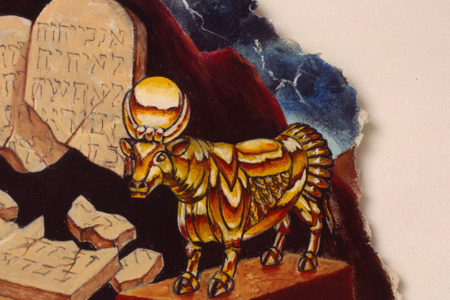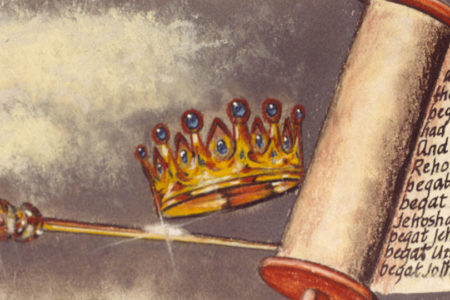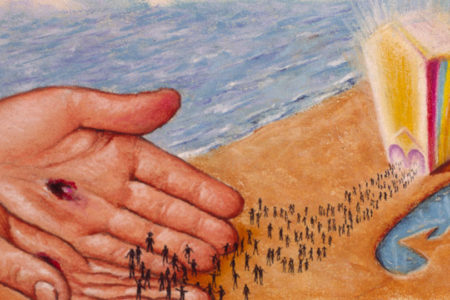The Abrahamic Covenant
It would not be appropriate to ask which is the most important Old Testament covenant. Each of the covenants plays its own unique role in God’s marvelous plan of redemption and is therefore very important. Most would agree, however, that the Abrahamic Covenant is the foundational to each of the subsequent divine promises. The Lord’s covenant with Abraham was the fountain from which flowed all of His redemptive purposes for Israel and for mankind as a whole. In a real sense, the remainder of the biblical account from Genesis 12 through the Revelation is an outworking of the covenant promises to the patriarch. Even Gentile believers are included, at least in a spiritual sense, in its provisions (Gen. 12:3; Gal. 3:29). The historical account of God’s covenant arrangement with Abraham (originally named Abram) is found in portions of four chapters: Genesis 12, 13, 15, and 17.
The main provisions of the covenant can be summed up in three unilateral promises to Abraham: a people, a blessing, and a land. Abraham was pledged an abundant seed—comparable to the sands of earth and the stars of heaven (Gen. 22:17). In a literal sense, this seed consists of all Abraham’s natural descendants through his promised son, Isaac, and his grandson, Jacob. Although Arabs may legitimately claim natural descent from Abraham, they do not descend from the branch of his descendants chosen to receive the promises. There is a strong biblical basis for tracing the Arab people back to Abraham through Hagar and her son Ishmael (see Gen. 16) as well as through his last wife, Keturah (Gen. 25:1–3).
In a spiritual sense, however, all believers partake of the spiritual blessings promised to Abraham. In Genesis 12:3, God stated, “I will bless them that bless thee, and curse him that curseth thee: and in thee shall all families of the earth be blessed.” Because the Messiah is the ultimate seed of Abraham, all people—Jew or Gentile—who are related by faith to the Messiah are also partakers of these spiritual blessings (see Gal. 3:7–9, 16).
The third promise to Abraham was a land—then called the land of Canaan because its inhabitants were descendants of Canaan, the cursed grandson of Noah (cp. Gen. 9:24–27 with 12:5–7). On four separate occasions, God reiterated this land promise to His faithful servant (Gen. 12:7; 13:14–15; 15:18–21; 17:8), whom He called “friend” (Jas. 2:23). Consider, for example, the following: “And I will give unto thee, and to thy seed after thee, the land wherein thou art a sojourner, all the land of Canaan, for an everlasting possession; and I will be their God” (Gen. 17:8). All three of these promises—a seed, a blessing, and a land—must be viewed as essential elements of the Abrahamic Covenant. The later biblical covenants actually amplify, extend, and elaborate on at least one of these essential elements of the Abrahamic Covenant.
The account of God’s dealings with Abraham in Genesis 15, however, is the only place where the exact phrase “the Lᴏʀᴅ made a covenant with Abram” is found (v. 18). The actual ceremony of ratifying this important contract between God and His friend is recorded in this crucial chapter. One Bible teacher has publicly stated on a number of occasions that, if he were on a desert island and permitted to possess only one Bible chapter, it would be Genesis 15. This chapter is important because it is vital to understanding the absolute certainty and reliability of God’s promises to His people.
The Lord made it clear to this elderly man that his household servant, Eliezer, would not be his heir. That privileged position would be held by a yet-unborn son (Gen. 15:1–4). As a matter of fact, although Abraham was childless at that time, he was told that one day his descendants would be as numerous as the myriad stars blanketing the Middle Eastern sky (Gen. 15:5). Abraham responded to this revelation and promise by simply trusting his Lord and receiving righteousness to his account: “And he believed in the Lᴏʀᴅ; and he counted it to him for righteousness” (15:6). Two thousand years later, the Apostle Paul and James so valued this text that they quoted it three times in their New Testament epistles (Rom. 4:3; Gal. 3:6; Jas. 2:23). If there is any doubt that faith always was the means to salvation, this basic text should dispel that doubt altogether.
After the certain promise of a physical heir, God again declared to Abraham the land promise: “And he said unto him, I am the Lᴏʀᴅ who brought thee out of Ur of the Chaldeans to give thee this land to inherit it” (Gen. 15:7). While not doubting the Word of God, Abraham responded by asking for one last proof so that he could be sure about this land inheritance (15:8).
The response of the Lord to Abraham’s request (15:9–17) composes one of the most fascinating and instructive incidents in the entire Bible. When the details of this ritual are sorted out, we stand amazed at the wondrous promise-keeping God we serve.
Obeying God’s instructions, Abraham cut in half three animals—a heifer, a goat, and a ram—along with a sacrificial dove and a pigeon (15:9–10). These were the clean animals that were used later in the Levitical sacrifices (see Num. 19:2; Lev. 3:12; 5:15; 12:6). Then a sudden sensation of horror came over the patriarch as unclean birds of prey swooped down on the carcasses. The Lord’s announcement of Israel’s future enslavement clarified the meaning of the attacking birds: “And he said unto Abram, Know of a surety that thy seed shall be a sojourner in a land that is not theirs, and shall serve them; and they shall afflict them four hundred years” (15:13). The word afflict is the same word used in Exodus 1:11–12 to describe Egypt’s later oppression of Israel. Egypt, like the birds of prey in the vision, would oppose the covenant with Abraham’s descendants, but God’s promises would be fulfilled in spite of their attacks on the people of Israel, and He would, after a period of 400 years, bring back His people from their sojourn among these birds of prey (15:14–16). They would then inherit the land of the Amorites (15:18–21) and would become the instrument of God’s judgment on that people’s iniquity.
Then, after sunset, God revealed Himself to Abraham through a smoking fire pot and a burning torch (15:17, literal translations). These images represent the glory of God, often represented in Scripture by fire (Ex. 3:2; 13:21). Jewish writings refer to this as the “shekinah,” the consuming holiness of God’s glory. In the darkness, Abraham saw nothing but the fiery elements that passed between the pieces of the slaughtered animals.
This account is followed by a crucial statement: “In the same day the Lord made a covenant with Abram … ” (15:18). The word made is literally cut. It is the Hebrew word karat, used 26 times in the Old Testament, usually with the word covenant (berit). It is also used literally of cutting wood (Dt. 29:11), cutting a garment (1 Sam. 24:5), and cutting the umbilical cord (Ezek 16:4).
The significance of this rather strange action lies in the participants cutting the animals and passing through the severed parts. The parties were pledging that if either one broke the covenant, that party would suffer the same cutting that their animals had undergone. Another example of this ceremony of cutting a covenant is found in Jeremiah 34:18–19: “And I will give the men who have transgressed my covenant, who have not performed the words of the covenant which they had made before me, when they cut the calf in two and passed between these parts, The princes of Judah, and the princes of Jerusalem, the eunuchs, and the priests, and all the people of the land, who passed between the parts of the calf.”
This passage demonstrates the exciting significance of God’s cutting a covenant with Abraham by passing between the pieces alone. By so doing, the Lord assured Abraham in the most graphic way possible that if He did not fulfill His own promises to Abraham, He would subject Himself to mutilation. Furthermore, in contrast to the normal procedure, God passed through the pieces by Himself, portraying what is called a unilateral covenant. In other words, regardless of what Abraham and his descendants did, God Himself would fulfill His promises to them. Because it is impossible for the sovereign Lord to be severed and mutilated, Abraham could rest assured that he would undoubtedly receive the promised seed, the promised blessing, and the promised land.
How appropriate, therefore, that God reiterated the land promise to Abraham in verse 18: “Unto thy seed have I given this land, from the river of Egypt unto the great river, the river Euphrates.” He even specified the boundaries of Israel’s land: from the “river of Egypt” (the Wadi el-Arish in the Sinai peninsula) to “the river Euphrates” (the long river that formed the ancient boundary between East and West). Today it courses through the modern country of Iraq. These are the southwestern and northeastern boundaries of the royal land grant to Abraham’s seed. Israel has never possessed this land in its entirety, but they will when Christ returns to reign as the messianic King!
Abraham and his descendants can, as we say, bank on these precious promises of the Abrahamic Covenant. They are as sure as God’s personal existence. He has pledged His own person toward their fulfillment. Nothing that mankind can do will invalidate these promises.
This solemn ceremony is an encouragement to our faith. If God fails in His promises to Israel, what assurance do we have of His promises to the church? But, in the words of Hebrews 6:13, “because [God] could swear by no greater, he swore by himself.” As believers, we can trust the marvelous fact that God’s promises are certain and sure! He will not deny Himself!









James is not Yahshua’s brothers name.James comes from the Greek name Demetrios- keeper of the Greek goddess-Demitria. Ya’acov is the Lords’ brothers name- which in English is JACOB not James.
\As you know Jacob means Usurper-which was Jacob;s purpose to usurp his Brother Esau’s Inheritance and birthright.
I hope that you don’t also celebrate Xmas?